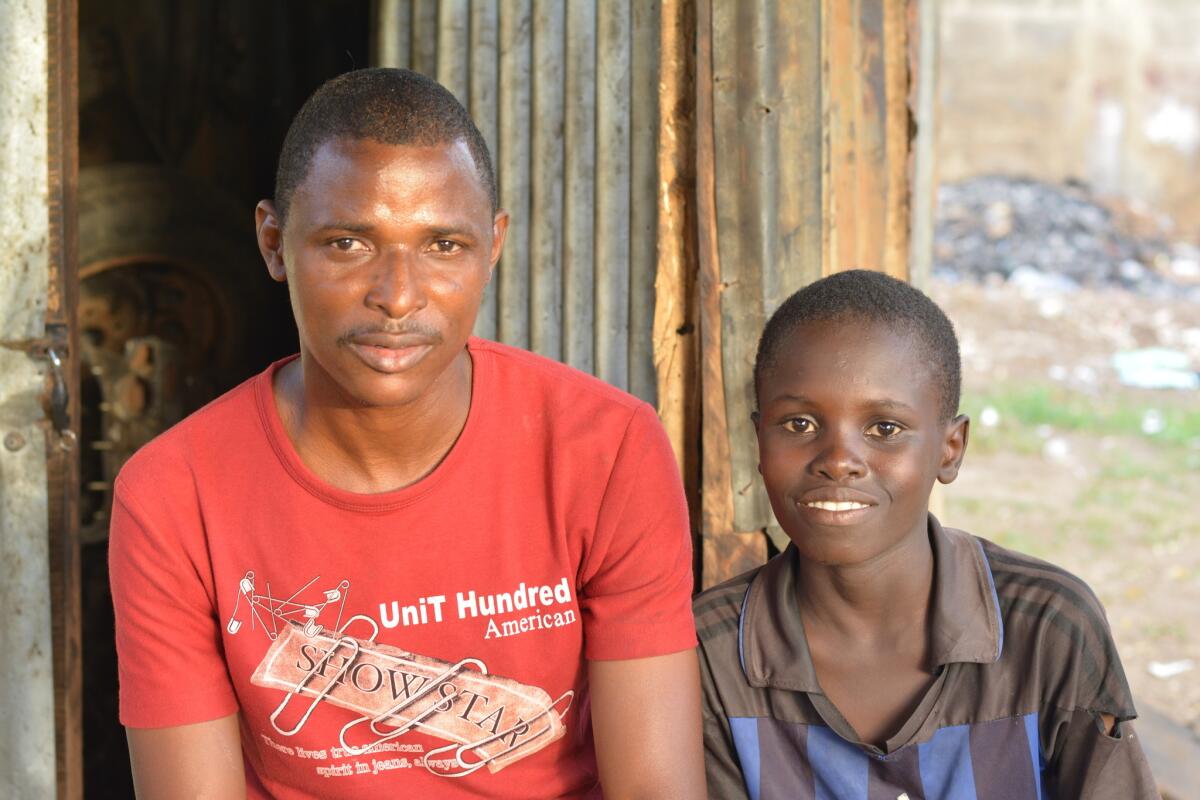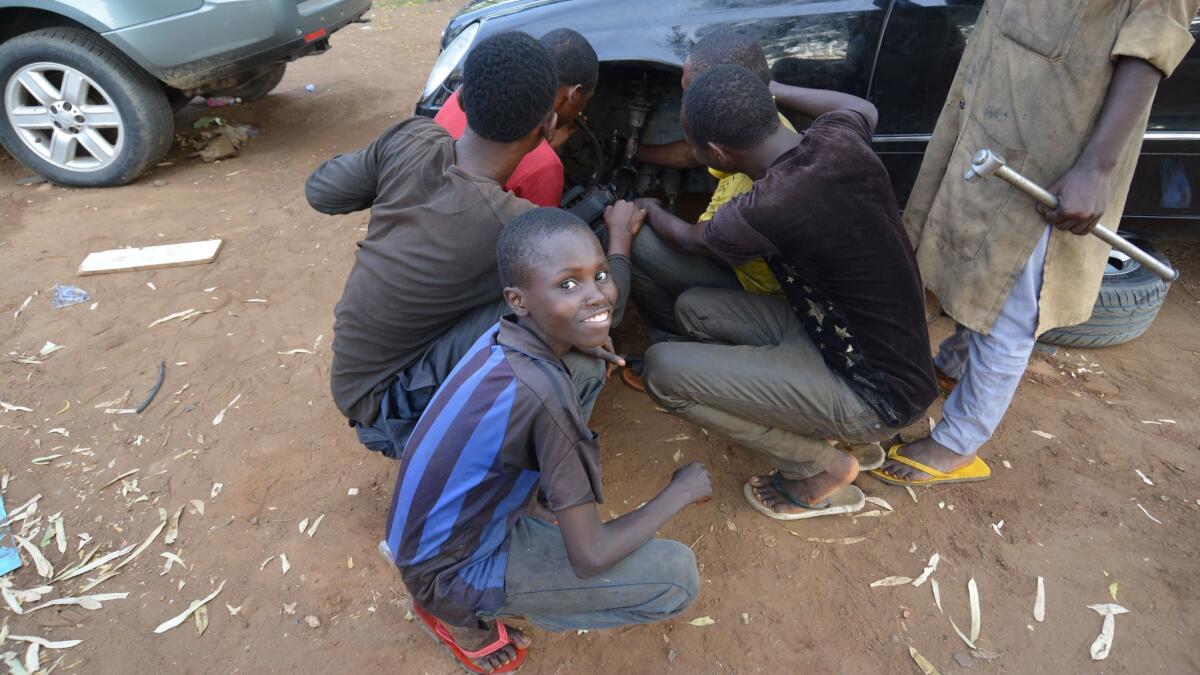In a Nigerian mechanic’s yard, life lessons and hope for a new generation

Reporting from Kano, Nigeria — In a mechanic’s yard in northern Nigeria, a skinny boy named Amir Yusuf flits about like a nervous bird. As four guys work on the front wheel of a black Mercedes, he’s in the thick of it, looking on. When two others hunch over an engine, he’s in there too.
His boss, Musa Ibrahim, a stringy, boyish fellow with a gentle smile, says being a car mechanic is a man’s job, but Amir looks barely 12. He scuttles to unlock a small tin shed, sealed by a small padlock, which houses tools, greasy engines and car parts piled higgledy-piggledy.
The lock won’t budge, but he fights it silently until it gives way.
When Amir says he is 15, people scoff. But his boss understands. He, too, was once a slight kid who looked young for his age, working in this same auto yard in Nigeria’s second biggest city, Kano. Even now, Ibrahim’s long, slender fingers seem more suited to some delicate trade, like tailoring.
His business doesn’t look like much. It has no name — so there’s no sign — and pipes, springs, wires, axles and other pieces of unidentifiable car junk fill one side of his yard. But Ibrahim employs 10 people, supports his large, extended family of parents, siblings, cousins, nieces and nephews, and is engaged to be married.
Amir’s father, an electrician, had worried that his oldest son would end up unemployed, in a street gang, or taking drugs and stealing. So he begged Ibrahim to take him on as an apprentice, afternoons, after school.
“I like school, but I adore this job,” the boy says. Two of his eight siblings died in infancy. He has to “run errands, jack up cars, change the wheels and change the engine oil. I have been here two months, but my enthusiasm increases by the day.”

Some things about the skinny boy remind the mechanic of himself.
Ibrahim grew up as a cattle herding boy, stealing wild honey from bees and diving naked into rivers. When he was a baby, his grandparents tied many amulets (written prayers housed in leather cases) onto his little body to make him strong and ward off the ill health, danger and bad luck that seem to plague so many lives here.
He only started school at 10 and had to drop out at 18, without graduating, because his parents were too poor to pay. He tried tailoring for two years, but it drove him crazy. In a city crawling with beggars and thousands of unemployed university graduates, joining a mechanic’s yard felt like his last chance. Ibrahim moved to Kano from another state and lived here with a brother while he became an apprentice.
But the boss wasn’t convinced he could handle the work. “I was lanky and I looked younger than my age,” Ibrahim recalled. “He said, ‘You can’t be a mechanic.’ I was really determined to prove him wrong.”
The boss was not easily pleased. He started at 7 a.m. and finished late, sometimes at 9 p.m., sometimes around midnight. Anyone who was late or wasted time was flogged.
Several times, Ibrahim got a worse punishment for misdemeanors like talking back to a superior or fighting with another worker. The boss made him lift an engine block with his bare hands and hold it above his head for two minutes.
“It wasn’t easy. Whenever you had to do that, you could hardly wake up the next day, your body was aching so much,” he said.
The job was so tough that Ibrahim gave up and ran back home to his parents. But his mother urged him to try again, telling him the only path to success in life was hard toil. He returned and learned the job in seven years before opening his own workshop. Later, he moved his business to the yard where he first began working 12 years earlier.
It seemed to him the amulets had worked.
“He’s a very kind boss,” says Amir, perched on a rickety bench, while Ibrahim keeps an eye on the other workers. “In the morning when he comes he buys us breakfast. He buys us takeaway food for lunch too and even when there’s no work, he pays us our daily wages.”
Ibrahim scolds his workers for being late or careless with his tools. “Sometimes I have to rant and shout when they cut corners.” But he doesn’t hit them, the way he was once beaten.
“I’m soft. I can’t do that,” he murmurs.
When a client says he is too kind to his apprentices, Ibrahim chuckles softly. But there’s another reason Ibrahim never hits anyone. He says his hands are “too strong.”
“My hands are like weapons. I know how much damage I can do when I beat someone, so I never beat anyone.”
His slender fingers were so powerful he says they became a problem several years ago.
“Each time I tried to tighten a bolt, I’d break it. The amulets were responsible for the damage I was wreaking. I was losing customers because I was breaking parts,” he said.
But he was afraid of what might happen if he gave the amulets up, so he explained the problem to his grandparents and they gave him permission to leave them at home. He stopped breaking things.
As he tells his story, an apprentice runs up with a broken radiator. Four workers, including Amir, cluster around, as Ibrahim patiently explains how to fix it. The group hurries off to carry out his instructions.
Amir attends school in the morning and works at the auto yard in the afternoon. At night he does his homework, often by the dim light of the family’s charcoal brazier. The only time he gets off to play soccer with his friends is Sunday afternoon.
“Honestly, I’m not under pressure,” he says earnestly. “I think I’m just lucky because I am preparing for my future. Not every kid has an opportunity like this. I pity them, because I know what I am gaining here.
“I learned two things from my boss. One, he’s honest. Two, he will not cheat. He will not inflate the prices, which is what a lot of mechanics do. In life, cheating doesn’t pay.”
Ibrahim’s grimy, oil-stained trade job was sneered at by college graduates when he started out.
“They thought it was for failures and people who couldn’t get a degree,” he says. “But now I am an employer of labor. I have friends who are graduates who haven’t achieved as much as I have. Many of them don’t have jobs.”
Boys and parents often beg Ibrahim for apprenticeship, but he has plenty. And when Amir looks at his boss, his eyes shine with boyish admiration. All he wants is to be just like him.
“My aim in life is to be able to have my own house and to set up my own workshop and employ my own apprentices, like my boss is doing with me.”
Darting around eagerly, Amir doesn’t notice Ibrahim’s face. But just occasionally, his boss throws him an approving glance.
ALSO:
Only Africans have been tried in at the court for the worst crimes on Earth
How a terrorist group set off a famine, threatening thousands of families
More to Read
Sign up for Essential California
The most important California stories and recommendations in your inbox every morning.
You may occasionally receive promotional content from the Los Angeles Times.









